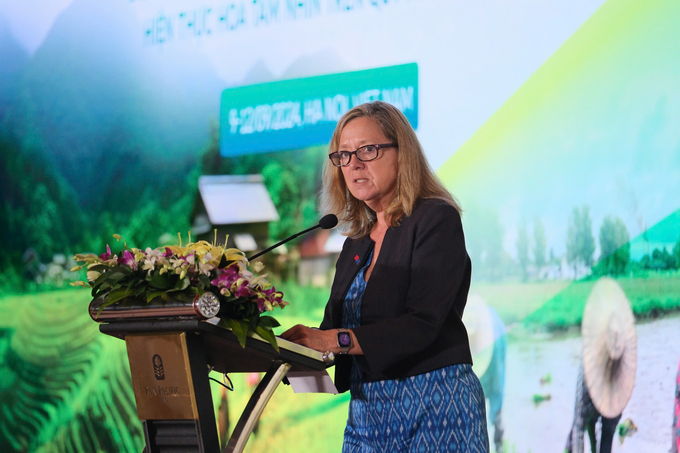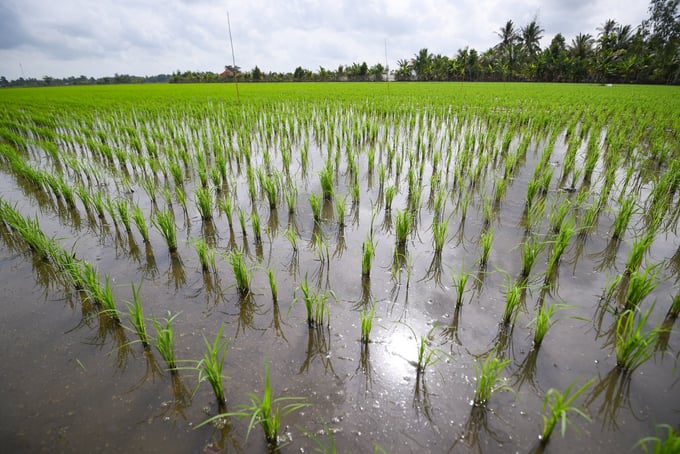May 16, 2025 | 10:08 GMT +7
May 16, 2025 | 10:08 GMT +7
Hotline: 0913.378.918
May 16, 2025 | 10:08 GMT +7
Hotline: 0913.378.918

The World Bank and MARD co-hosted the regional forum ‘Realizing the vision of low-emission rice across landscapes’ on September 9. Photo: Quynh Chi.
According to Sherman, this event, co-hosted by the World Bank and Vietnam’s Ministry of Agriculture and Rural Development (MARD), is an important part of the Food Systems, Land Use and Restoration Global Knowledge Platform.
The platform aims to address the pressing need for gender equality in the world, address the pressing need for gender equality in the world, and identify the technological advancements and innovations that will propel participating countries towards the goals. Country projects will illustrate how actions in the field are contributing towards bringing fuller objectives to fruition.
The significance of rice to the global population cannot, of course, be overstated, said Sherman. As a staple food for over half the world’s inhabitants, particularly in Asia, Latin America, and Africa, rice is more than only a crop.
“It is a lifeline. It sustains economies, provides livelihoods to countless farmers and workers, and underpins food security, ensuring that burgeoning populations have access to the essential calories they need,” World Bank representative expressed.
Yet the impact of rice production extends beyond nourishment and commerce. It is inextricably linked to our climate. Rice paddies are portable methane emitters, contributing to greenhouse gases that drive global warming.
However, through innovative agricultural practices, the World Bank believes riparian countries have the power to transform rice cultivation into a model of sustainability, mitigating its environmental footprint while enhancing its quality and yield. The global rice market, too, is sensitive to the ebbs and flows of production.
As such, the World Bank’s commitment to sustainability is a key factor in the development of rice. The siloing of sustainable rice farming is not only a matter of food security, but also of economic stability and climate action. Vietnam stands as a testament to the transformative potential of low emission rice production. The nation's rice sector is crucial to socio-economic resilience, ensuring food security, and propelling economic growth.

The World Bank commits to transforming rice production in Vietnam. Photo: Quynh Chi.
The World Bank recognized Vietnam’s actions to address these issues, aiming to transform the Mekong Delta rice production into a high-quality, low-carbon system. This is crucial for national food security, sector sustainability, and maintaining a competitive edge globally. Strategies include the National Green Growth Strategy, the Sustainable Agriculture and Rural Development Strategy, and the Mekong Delta Regional Master Plan.
Despite impressive yields, Vietnam’s rice sector faces challenges, including the need to increase farmer income and the reduction of environmental and greenhouse gas impacts. The country’s proactive stance on these issues, including the commitment to a 30% reduction in methane emission by 2030, sets a commendable precedent.
The World Bank’s support through the Vietnam Sustainable Agricultural Transformation Project (VnSAT) has already yielded remarkable results in the Mekong Delta, demonstrating the viability of sustainable low-carbon rice farming, with significant increases in profitability at about 30 percent, reductions in production costs at about 25%, and a notable decrease in CO2 emissions, about 1.5 million metric tons annually.
VnSAT has laid the groundwork for the government’s ambitious one million hectare high quality and low-carbon rice program. This program promises to further revolutionize the sector, enhancing global competitiveness, attracting private investment, and contributing to environmental conservation and greenhouse gas reduction.
Sherman emphasized the guests’ presence in Vietnam was no coincidence.
“It’s a strategic choice to engage in this dialogue where the rice sector’s evolution is most palpable. I’m confident that I’m going to be a part of this dialogue. Our discussions will be fruitful, our field visits enlightening, and our conclusion is actionable,” World Bank representative highlighted.

The World Bank advocates for a regional approach to Vietnam’s 1 million hectares of rice program. Photo: Tung Dinh.
The World Bank advocates for a regional approach to Vietnam’s low-carbon rice program, believing it offers economies of scale, making certain project components more efficient and cost-effective to implement. For instance, establishing low-carbon rice standards, carbon finance crediting methodology, database and MRV (Measurement, Reporting, and Verification) design and adoption, and certification schemes can be implemented at the national or regional level with sufficient critical mass or economies of scale, rather than having each province develop certification process and participate in carbon credit markets on its own. This approach reduces costs and ensures consistency in the certification process across the region.
Besides, a regional approach can attract investors, international buyers, and resources from global carbon finance and development partners. This is particularly important given the ambitious targets of the low-carbon rice program and the significant investment required for technology development, capacity building, and infrastructure upgrading.

(VAN) Cold-barn systems efficiently manage environmental and temperature conditions, which aids in the prevention of respiratory diseases in pigs and protects them from the vectors that transmit African swine fevers.

(VAN) To tackle challenges, the project 'Addressing key technical bottlenecks in the grouper supply chain in Vietnam' has been underway since 2024.

(VAN) The project 'Disease-Resilient and Sustainable Cassava Production Systems in the Mekong Region', funded by the Australian Center for International Agricultural Research (ACIAR), is being implemented from 2024 to 2028.

(VAN) Data from 10,000 farming households will help professionalize production organization and support the implementation of the One Million Hectares Program for High-Quality, Low-Emission Rice Cultivation.

(VAN) FAO Director-General QU Dongyu marks International Day of Plant Health at NENA conference.

(VAN) Deputy Minister of Agriculture and Environment Hoang Trung affirmed that floriculture and ornamental plants are a growing industry that receives significant global attention.

(VAN) The three staple crops dominating modern diets – corn, rice and wheat – are familiar to Americans. However, fourth place is held by a dark horse: cassava.